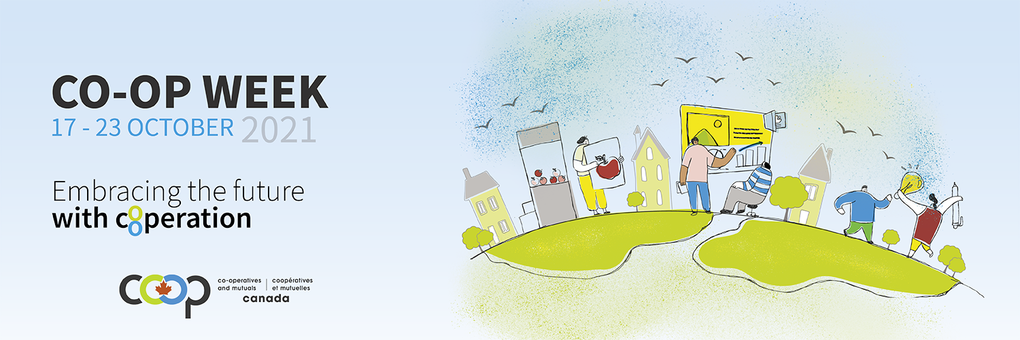We want to provide you with the best customer experience possible! By selecting your community, we can give you accurate and up-to-date information about our services.
Your community selection will be remembered in your browser for 30 days.
To change your community after the initial selection, click the location tool in the top right corner.
What if my community isn't listed?
Please select a community for us to provide you with an optimal experience during your visit on our website.

If you are wondering what Co-op Week is and why we celebrate it, we'll get to that later in this blog. For now, let's start from the beginning because aside from a few details, how many people truly know what a cooperative is and how it works?
From grocery stores to service providers, cooperatives come in many different sizes and are integral to our economy. Let's dive deeper into the specifics of a cooperative.

A co-op is an organization that is owned and democratically controlled by its Members, for its Members.
The Members of a co-op determine how the business will run, elect the Board of Directors, and ensure the organization is following the cooperative principles - that all cooperatives share internationally.
Cooperatives can provide nearly any product or service and can be either non-profit, or for-profit organizations.

Cooperatives were created to bring people together and build a better, more sustainable world through cooperation.
Cooperative members believe in the ethical values of honesty, openness, social responsibility and caring for others.
The main difference between a traditional business's structure and a cooperatives' structure is their priorities. A Cooperative's primary goal is to meet its membership's needs in a productive, self-sufficient, and socially responsible manner.
The same seven principles guide all cooperatives:
Cooperatives are voluntary organizations, open to all persons able to use their services and willing to accept the responsibilities of Membership, without gender, social, racial, political or religious discrimination.
Cooperatives are democratic organizations controlled by their Members, who actively participate in setting their policies, and making decisions. Men and women serving as elected representatives are accountable to the Membership. In primary cooperatives, Members have equal voting rights (one Member, one vote) and cooperatives at other levels are also organized in a democratic manner.
Members contribute equitably to, and democratically control, the capital of their cooperative. At least part of that capital is usually the common property of the cooperative. Members usually receive limited compensation, if any, on capital subscribed as a condition of Membership. Members allocate surpluses for any or all of the following purposes: developing their cooperative, possibly by setting up reserves, part of which at least would be indivisible; benefiting Members in proportion to their transactions with the cooperative; and supporting other activities approved by the Membership.
Cooperatives are autonomous, self-help organizations controlled by their Members. If they enter into agreements with other organizations, including governments, or raise capital from external sources, they do so on terms that ensure democratic control by their Members and maintain their cooperative autonomy.
Cooperatives provide education and training for their Members, elected representatives, managers, and employees so they can contribute effectively to the development of their cooperatives. They inform the general public - particularly young people and opinion leaders - about the nature and benefits of cooperation.
Cooperatives serve their Members most effectively and strengthen the cooperative movement by working together through local, national, regional and international structures.
Cooperatives work for the sustainable development of their communities through policies approved by their Members.
These values were created by the International Cooperative Alliance (ICA) to help cooperators run their businesses more efficiently and effectively. The Statement on the Corporate Identity values was internationally agreed upon.
A growing number of people in Canada and around the world are recognizing the benefits of taking part in a cooperative. Though there are many unique cooperatives, here are the main five types you can take part in:
Producer cooperatives: Some cooperatives process and market their Members' products and services directly. Other producer cooperatives may lessen costs and strain on input necessary to their Members' economic activities, with a mutual benefit for the producer. Examples: Agriculture cooperatives, advisory services, etc.
Multi-stakeholder cooperatives: The Membership of these cooperatives is made of different categories of Members who share a common interest in the organization. Examples: home care services, health services, community services, etc.
Housing cooperatives: These types of cooperatives allow for the opportunity to share costs of home ownership or a building ownership. Examples: condominiums, rentals, etc.
Now that you are familiar with cooperatives and what they are, we can answer your question!
What is Co-op Week, and why do we celebrate it?
Co-op Week is when we acknowledge the impact cooperatives have in our communities and the highlights and accomplishments they have achieved. Co-op Week is celebrated annually in the third week of October. We celebrate Co-op Week with events hosted in communities across the country to improve understanding and awareness of the cooperative business model.
You now know what Co-op week is, but don't stop reading just yet! Here are a few fun facts about cooperatives and Westman Communications Group!
Three Fun Facts About Cooperatives:
Three Fun Facts about Westman as a cooperative:
Happy Co-op Week 2021 from your friends,
If you have any comments or questions, or you have a topic that would make a good blog post, please email us at marketing@westmancom.com